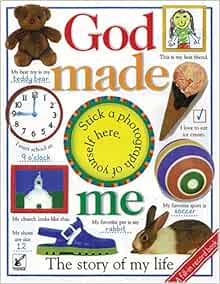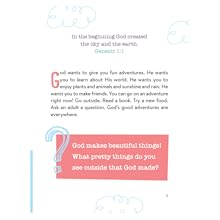The concept of identity is a profound theme that resonates deeply within the human experience. In literature, art, and personal narratives, the exploration of identity often reveals the complexities of self-perception, societal roles, and the innate struggle for authenticity. The narrative “God Made Me” serves as an illuminating exploration of identity, encompassing themes of self-worth, belonging, and the interplay between divine creation and personal agency. This article delves into these themes, providing insights and examples that help to illuminate the nuanced nature of identity as articulated in this narrative.
The Foundation of Identity: Divine Creation

At the heart of “God Made Me” lies the belief that each individual is intentionally crafted by a higher power. This idea serves as a foundational aspect of identity, suggesting that people are not random occurrences but rather unique expressions of divine creativity. This perspective can significantly impact self-perception and personal identity in several ways:
- Inherent Value: The notion that one is created by God imbues life with intrinsic value. Individuals may feel a deeper sense of purpose and worth, knowing they are part of a larger plan.
- Acceptance of Differences: Recognizing that diversity is part of divine creation fosters acceptance of oneself and others. It encourages individuals to celebrate their unique attributes rather than conforming to societal norms.
- Empowerment: Understanding oneself as a divine creation can empower individuals to embrace their identity confidently, leading to personal growth and resilience in the face of adversity.
For instance, a case study on individuals from diverse religious backgrounds shows that those who view their identity as divinely crafted are often more resilient to societal pressures regarding conformity. This resilience is particularly evident in young people who face bullying or exclusion; their belief in their inherent worth often shields them from the emotional toll of such experiences.
Self-Worth and Identity

Another significant theme in “God Made Me” is the connection between self-worth and identity. The narrative suggests that understanding one’s identity is closely tied to recognizing one’s value. This theme is explored through various dimensions:
- Affirmation of Self: The narrative encourages individuals to affirm their worth, regardless of external validation. This idea is crucial for fostering a healthy self-image.
- Overcoming Negative Narratives: Many individuals struggle with internalized negative beliefs about their identity. “God Made Me” inspires readers to challenge these narratives and replace them with affirmations of their worth.
- Community Support: The significance of community in affirming identity cannot be overstated. Supportive environments can enhance self-worth and reinforce positive identities.
Statistics reveal that positive affirmations and recognition from peers can significantly impact an individual’s self-esteem. A study found that students who received regular affirmations from teachers and peers demonstrated higher self-worth and academic performance. This reflects the narrative’s emphasis on community in shaping identity.
Belonging and Identity

The theme of belonging is intricately woven into the fabric of identity in “God Made Me.” The narrative highlights the importance of finding a place where individuals feel accepted and valued. This theme manifests in several ways:
- Cultural Identity: Many individuals derive a significant part of their identity from their cultural background. The narrative encourages exploration and celebration of one’s heritage as a means of fostering belonging.
- Spiritual Connection: The sense of belonging to a community of faith or belief can greatly enhance one’s identity. It provides a framework for understanding oneself in relation to others and to the divine.
- Social Networks: Building meaningful relationships can create a sense of belonging that is crucial for personal identity. These networks can provide emotional support and validation.
For example, a qualitative study involving immigrants revealed that those who actively participated in community groups that celebrated their cultural identity reported a stronger sense of belonging and self-acceptance. This finding supports the narrative’s assertion that belonging enhances identity.
The Interplay of Agency and Identity

While “God Made Me” emphasizes divine creation, it also acknowledges the role of personal agency in the formation of identity. This interplay raises critical questions about the balance between destiny and self-determination:
- Personal Choices: The narrative suggests that while individuals are created with purpose, they also have the agency to shape their identities through choices and experiences.
- Resilience in Adversity: The ability to navigate challenges and setbacks is a crucial aspect of identity development. The narrative encourages individuals to view obstacles as opportunities for growth.
- Identity Evolution: Identity is not static; it evolves based on experiences, relationships, and personal choices. The narrative invites readers to embrace this fluidity and recognize that change is a natural part of identity formation.
Research supports the idea that individuals who perceive themselves as agents in their identity formation are more likely to experience personal growth. A longitudinal study showed that young adults who actively engaged in self-reflection and made conscious choices about their identity reported higher levels of life satisfaction and fulfillment.
Conclusion: The Multifaceted Nature of Identity

“God Made Me” serves as a powerful exploration of the themes of identity, intertwining the concepts of divine creation, self-worth, belonging, and personal agency. Through its narrative, readers are encouraged to reflect on their unique identities, recognize their inherent value, and embrace their diverse backgrounds. The insights gleaned from this exploration highlight that identity is a multifaceted construct shaped by both internal beliefs and external influences.
In summary, this narrative not only affirms the worth of each individual but also challenges them to actively engage in the ongoing process of identity formation. As we navigate the complexities of our identities, let us draw inspiration from the belief that we are all uniquely made, with the potential to shape our lives and the world around us.




